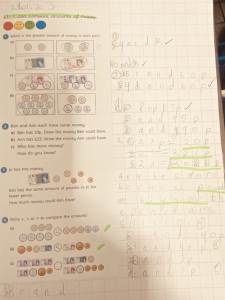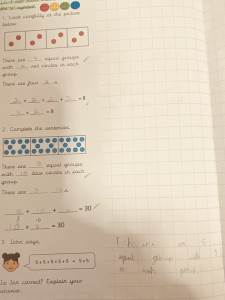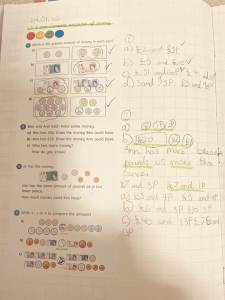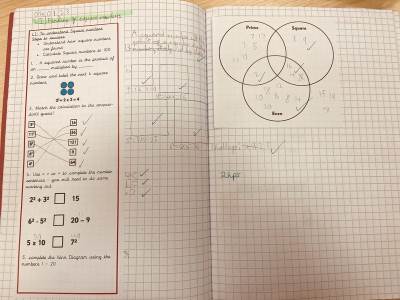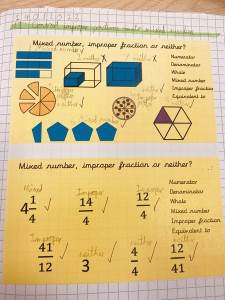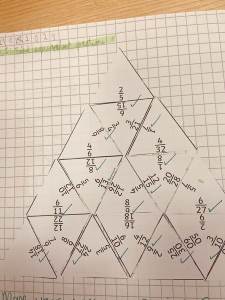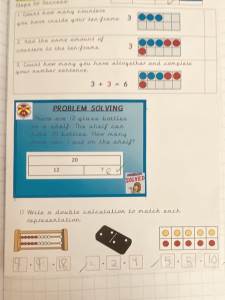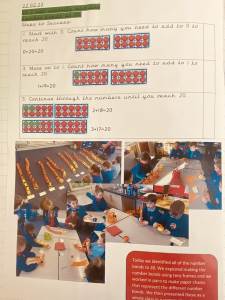Maths

Maths makes us confident, curious and creative problem solvers.
Intent
At St Columba’s, we believe that Maths is more than just numbers – it’s a vital life skill and a powerful way for children to understand the world around them, all through the lens of our Catholic faith.
Our aim is to give every child a strong and lasting foundation in mathematics. We want them to develop a deep understanding of key concepts, become confident with numbers, and learn to solve problems with creativity and logic. This learning builds gradually over time, helping children grow in confidence and ability at every stage.
We strive to make Maths enjoyable, engaging, and meaningful. Children are encouraged to see how Maths connects with their everyday lives, their values, and their faith. As they learn, they develop a moral awareness of how Maths can be used to help others and make the world a more just and caring place.
We want every child to know that Maths opens doors to exciting opportunities in the future – whether it’s in accountancy, engineering, design, science, or countless other careers. Our goal is to inspire future inventors, pioneers, and problem-solvers who use their talents to build a more caring and fair society.
Implementation
Children have a Maths lesson of at least one hour every day with same day intervention where necessary in addition to this lesson. Targeted and regular intervention allows children to explore their misconceptions and become more resilient when finding work challenging. A metacognitive approach means that pupils are encouraged to access strategies which worked well for them in previous lessons. The use of pre- assessment and knowledge organisers means that pupils’ prior learning is activated in order to introduce new and related content.
The whole school follows a mastery approach which is based on the use of concrete, pictorial and abstract to support mathematical understanding. Long, medium and short term planning that is progressive and cohesive across the year groups and provides opportunities to revisit. We provide quality first teaching in line with the teaching standards.
All teachers:
- ‘Know where their children are’ through the use of concise summative assessment, prior learning, assessment, Maths talk.
- ‘Understand where their children need to be’ through a secure understanding of year group expectations and/or pre key stage expectations and incisive, ongoing, formative assessment
- ‘Know how they are going to get them there’ through the use of a range of strategies to promote independence, mastery and high expectations of all learners.
- Plan for progression during and between lessons.
SEND and disadvantaged pupils are supported in the learning individually. There is no cap on learning as we want all children to achieve their full potential. Teachers aim to meet all learning needs through differentiation and the use on concrete resources. Support is guided through information on the individual pupil’s My Support Plans and through Assessment for Learning.
Teachers will use arithmetic quizzes including Flashbacks to refresh knowledge of prior learning to ensure children know and remember more.
Impact
By the end of KS2 we aim for children to be fluent in the fundamentals of mathematics with a conceptual understanding and the ability to recall and apply knowledge rapidly and accurately. They should have the skills to solve problems by applying their mathematics to a variety of situations with increasing sophistication, including in unfamiliar contexts and to model real-life scenarios. Children will be able to reason mathematically by following a line of enquiry and develop and present a justification, argument or proof using mathematical language. Most importantly, children will have felt confident and successful in Maths lessons which will enable them to transfer their knowledge in this subject into the next phase of their education.
The children will have:
- Quick recall of facts and procedures
- The flexibility and fluidity to move between different contexts and representations of Mathematics
- The ability to recognise relationships and make connections in Mathematics
- The ability to show how a mathematical concept or skill has been mastered when a child can show it in multiple ways, using the mathematical language to explain their ideas, and can independently apply the concept to new problems in an unfamiliar environment
- An understanding of the value of money and can calculate; the total cost of products and the amount of change needed
- A secure understanding of being able to tell the time and calculate duration.

Examples of pupil work in Maths across KS1 and KS2:
Early Years and Foundation Stage Progression of Skills
Maths Progression for KS1 and KS2
Progression-of-maths-ks1-and-ks2
Calculation Policy for KS1 and KS2
Vocabulary Progression EYFS to Year 6
st columbas vocabulary progression.pdf
Examples of Knowledge Mats from KS1 and KS2






